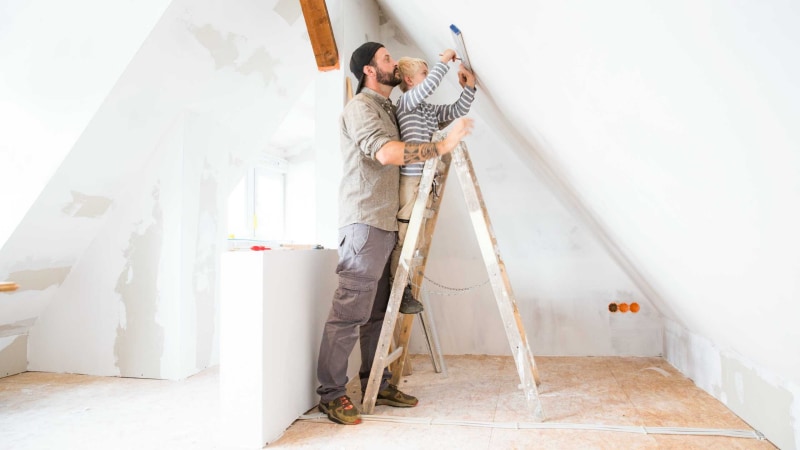What are boiler rooms?

Being able to maintain a safe and warm home is a priority for most homeowners and homebuyers, and a building’s boiler room is often where this magic happens. As these rooms are generally nestled in basements, hidden away from common areas, it’s unsurprising that some people would wonder, “What are boiler rooms?” Because warmth is a key function of a residence, it’s important for homeowners to understand how boilers and boiler rooms function, how to keep these spaces safe and how to properly maintain them.
What is a boiler in a house?
Put simply, boilers are a type of appliance used to heat the home. Boilers work by heating water, possibly to the point of boiling (hence the name). The resulting hot water or steam is then pushed through pipes or a radiant heating system to heat your home.
How do boilers work?
Now that we know what a boiler is we can explore exactly what boilers do in a house to heat it. Boilers go through several different processes to provide spaces with warmth. Here’s a breakdown of how they function:
- Fuel or energy source:To heat water you’re going to need an energy source. While most boilers use natural gas or oil, others run on electricity or coal.
- Combustion: This is a fancy word for burning. Boilers burn (combust) their fuel in what’s called a combustion chamber, which creates heat energy.
- Heat transfer: The heat created during combustion is then transferred to the water through a series of tubes or coils. Eventually the water is brought to a temperature that’s just before boiling, or heats to the point of turning into steam, depending on the boiler.
- Pressure buildup: In boilers that create steam, the vapor expands, which in turn builds up pressure within the boiler.
- Distribution: At this point, the hot water or steam travels through pipes to distribute heat wherever it’s needed, often through radiators.
- Cooling: After the heat is distributed, the water cools and, in the case of steam, condenses. The cool water, in both cases, is generally then sent back to the boiler where the process begins again.
While most boilers function in this way, there are several types of boilers that may function slightly differently. Let’s look at the types of boilers you may encounter in a home and how they differ from one another.
Types of boilers
- Conventional boiler: A conventional boiler (also known as a regular boiler) is made up of a central heating boiler and a water tank or cylinder. As conventional boilers are generally gravity-fed, the water tank is often above the boiler or in the attic. Because housing these two components may require ample space, these boilers work best in larger homes with many occupants that may have high demand for heating and hot water.
- System boiler:These boilers function similarly to conventional boilers, but they don’t require a separate water tank in the attic or elsewhere. Instead, system boilers heat water within their tank or cylinder. While this saves some space, your home must be able to accommodate the tank.
- Combination boiler:If you’re living somewhere with limited space, a combination boiler might be a good heating option. Combination boilers heat water on demand, which eliminates the need for a separate water tank. These boilers provide heating and hot water in a single unit, which means they require less space than conventional boilers. However, combination boilers may not be able to provide enough water for multiple showers, appliances or faucets to run simultaneously, so they’re probably best suited for smaller families or occupancies.
- Condensing boilers:If you’re looking for an energy efficient boiler, a condensing boiler may be a solid option. While condensing boilers do use combustion for heating, they also recover some of the hot gases created during the combustion process. This heat is then pushed to a home’s radiators or hot water. Because this leads to less energy consumption, a condensing boiler might help homeowners save on their energy bills.
Boilers vs. hot water heaters: What’s the difference?
While some boilers come bundled with a hot water heater (either built into the same unit or installed beside it), others are purchased separately. Though boilers and hot water heaters share the same function (heating hot water), they usually serve different purposes and operate in their own ways. Here’s a breakdown of their similarities and differences:
Similarities
- Boilers and hot water heaters are designed to heat water.
- Both mechanisms help distribute water throughout the home.
- Both can operate using a variety of fuel sources, from natural gas, propane and electricity to solar power.
- Both have a similar lifespan of roughly 20 years with proper maintenance.
- Both hot water heaters and boilers are excluded from homeowners insurance coverage unless they’ve been damaged by a covered issue.
Differences
- In most cases, the water from a boiler is non-potable, while hot water heaters heat water that is safe for domestic use, whether that’s heating up water for a shower or water that is going to be consumed.
- Boilers tend to heat water with the purpose of heating a space, while hot water heaters are meant to heat water to be used for bathing, washing dishes, cleaning or drinking.
- While boilers tend to heat water close to boiling temperature, hot water heaters are heated to lower temperatures that are more appropriate for their domestic purposes.
Are boiler rooms dangerous?
Most large appliances come with their own unique risks and safety considerations. Boilers that aren’t installed, operated or maintained correctly may be hazardous.
Boiler risks
- Fires: As boilers often use combustion to generate heat, they’re susceptible to fire hazards like fuel leaks, combustion system issues or possible electrical malfunction.
- Explosions: If a boiler is installed incorrectly it may be at risk of explosion. If the boiler explodes, it could cause damage to the home and potentially injure any occupants.
- Carbon monoxide poisoning: If you’re not properly maintaining your boiler or it wasn’t properly installed, your home and its occupants could be in danger of carbon monoxide poisoning. Carbon monoxide is a colorless, odorless gas that’s created from combustion. As boilers often burn fuel to create heat, they may be a culprit of carbon monoxide-related issues if they aren’t properly installed or maintained.
- Scalding and burns: Working with hot water comes with the risk of burns, and boilers usually require water that’s nearly boiling to function.
- Water leaks and damage: Like dishwashers, washing machines and other water-related appliances, boilers may be susceptible to occasional leaks, along with any water damage that may result from them.
Boiler room safety tips
While some boiler room hazards might seem scary, proper installation, maintenance and precautions may help prevent accidents from occurring. It may be beneficial to familiarize yourself with some safety measures and precautionary actions that may help prevent or mitigate any issues. Here are some tips for making sure your boiler room is operating as safely as possible.
Installation and setup
Having your boiler installed correctly is an important first step when it comes to boiler room safety. Here are some tips that may help ensure safe installation and proper setup:
- Hire a professional: Hiring a licensed technician to handle your boiler or hot water heater installation is generally best, as setting it up improperly could raise the risk of potential explosion or carbon monoxide poisoning.
- Choose location wisely: Ventilation is an important aspect of boiler safety, so it may be helpful to install your boiler in an area with good ventilation, far from any flammable materials. It’s generally good practice to ensure your boiler is in a dedicated room, free of clutter.
- Be aware of boiler room code requirements: Try to obtain any necessary permits for your boiler and check to see that you’re following any relevant building codes in your area. As boiler code requirements differ from place to place, it helps to get in touch with local authorities to make sure you’re aware of any codes regarding location, access, ventilation, maintenance and fire protection.
Operating and maintaining your boiler
Once your boiler has been safely installed and is up to code, you’ll want to make sure you’re operating the appliance correctly and maintaining it properly as well.
- Keep instruction manuals handy: When you’re operating a potentially dangerous device or appliance, it’s generally a good idea to make sure you’re following instructions. As such, it may be helpful to keep any manuals in an easy-to-access location for reference purposes.
- Regulate temperatures with your thermostat: Thermostats might allow you to maintain comfortable temperatures in your home, but they’re also helpful when it comes to preventing the boiler from overheating or pipes from freezing.
- Bleed air regularly: Despite the gory name, “bleeding” is just releasing trapped air from your heating system since air bubbles may prevent the proper flow of hot water through your radiator pipes. Hiring a professional to bleed air from your boiler (or potentially learning to do it yourself, depending on your boiler) may help keep your boiler and heating systems working more efficiently over time.
- Annual inspection: Having your boiler inspected by a professional is an important component of a boiler safety plan since a licensed technician may notice issues that homeowners likely won’t.
- Flue and venting: As blockages, leaks and corrosion may cause potentially dangerous problems, inspecting the venting and flue systems is something you may want to have a professional help you with regularly.
- Test your valves: The valves that help your boiler regulate temperature or pressure are crucial to maintaining boiler safety. Try to have them tested periodically by a professional to make sure they’re functioning properly.
- Combustion safety: Paying attention to your combustion chamber could help you prevent an accidental fire from happening. You’ll want to keep an eye out for soot, corrosion or other regularities.
- Carbon monoxide detectors: While proper installation, operation and maintenance may be your best defense against boiler room accidents, carbon monoxide detectors may bolster the room’s safety. Since carbon monoxide is an odorless, colorless gas, installing detectors inside and outside of your boiler room may be one way to protect yourself and your family from harm
In summary
Boilers are an essential but somewhat complicated home appliance, so it’s no wonder that people are searching for questions like, “What are boiler rooms?” Boiler rooms house boilers, which are often the main source of a home’s heating supply. While these powerful appliances can enhance our lives and keep us cozy, they do come with potential hazards that may put you in metaphorical hot water if you aren’t careful. Fortunately, understanding how to operate, maintain and inspect your boiler (and knowing when to call on a professional) can help keep your family and your home warm, safe and sound.



